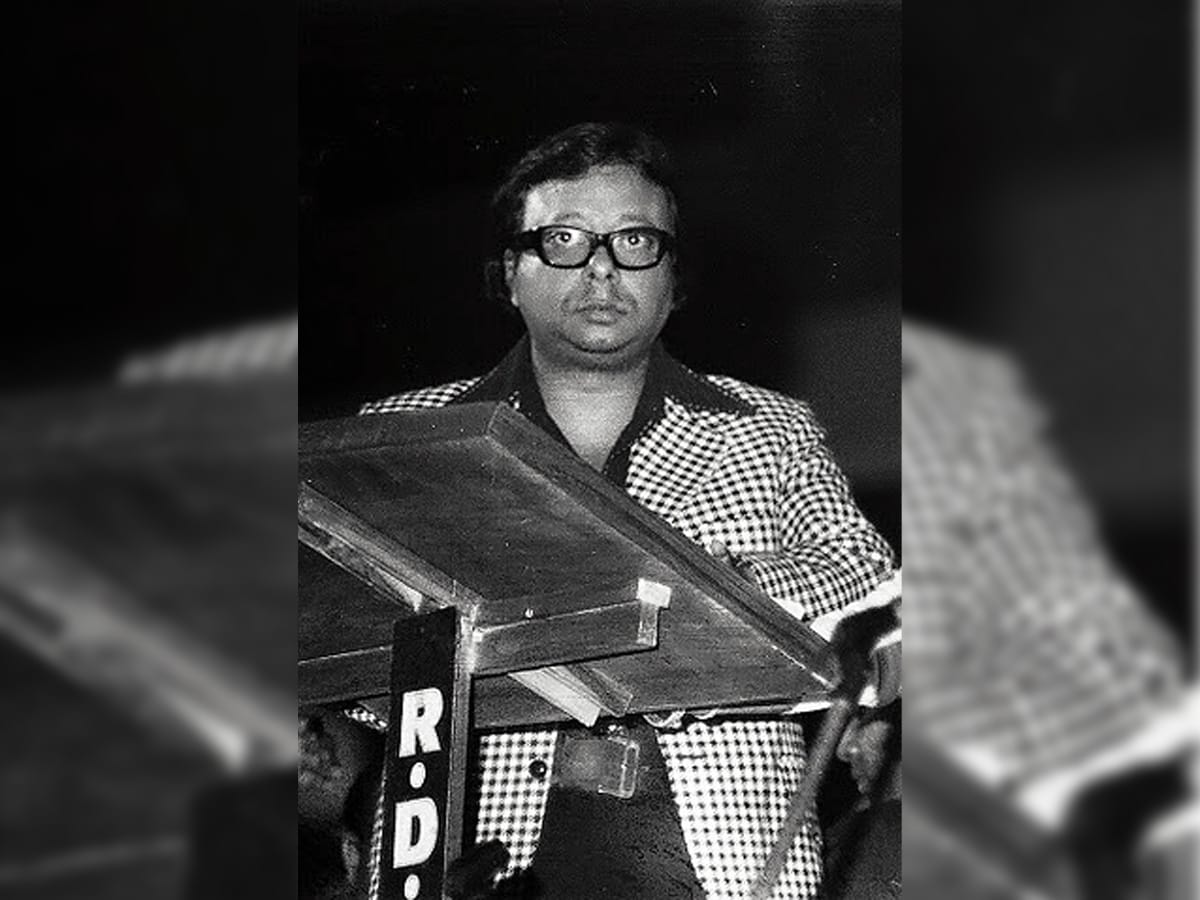
It is difficult to imagine that thirty years have passed since the demise of R.D. Burman. His music continues to live among us although he died on Jan 4th, 1994. The end came after a massive heart attack at the age of 54. The last of his friends to see him alive was filmmaker Vidhu Vinod Chopra. The latter had gone to RD’s home to discuss some points about the film 1942: A Love Story. The filmmaker left RD’s house at 9.30 p.m. The next day Chopra woke up to know that RD was no more.
RD was a genius. He began composing at the tender age of nine. He composed music for a song titled Aye Meri Topi Palat Ke Aa. It was later used by his father Sachin Dev Burman in the Chetan Anand film Funtoosh released in 1956. The song was sung by Kishore Kumar and picturised on Dev Anand.
RD, or Pancham (a name given to him by Dadamoni Ashok Kumar) is still considered to be one of the most successful music directors in Bollywood. He composed musical scores for 331 films and introduced innovative methods to create a different type of music that became hugely popular with the masses.
RD’s introduction to Western music came through Kersi Lord, a music composer and accordion player who had worked with reputed names like Naushad, Madan Mohan, S.D. Burman and others. Kersi Lord had an enormous collection of jazz, Latin American, and European music. Listening to those records made RD fall in love with the lilting tunes and he adapted many of them into his music.
Eccentric at times
At times RD was eccentric in his behaviour, just like singer Kishore Kumar. In 1965, shortly before the film Bhoot Bangla was released, he caught some boys trying to steal mangoes from a tree. He took them into his “custody” and made them sit around him while he sang the song Jago Sone Walo which was in the film that was yet to be released.
RD was a good mouth organ player. Those who have seen the 1964 film Dosti may recall a song with very moving lyrics. The story is about two young men, one blind and the other physically challenged, who eke out a living by singing on the streets. The song (sung by Mohammed Rafi) starts with the lines Janewalo Zara, Mudke Dekho Mujhe, Ek Insaan Hoon, Main Tumhari Tarah. One of the boys plays the mouth organ and the other sings the song. The mouth organ was played by RD Burman while recording the song.
RD and Gulzar– a great team
RD and Gulzar formed a good team. The duo combined to create some of the most memorable numbers in the film industry. These include Musafir Hoon Yaro from Parichay, Tere Bina Zindagi Se Koi from Aandhi, O Manjhi Re from Kushboo, Tujhse Naraz Nahi Zindagi from Masoom and Mera Kuch Saman from Ijaazat. These songs can never be forgotten.
The first of these, Musafir Hoon Yaro, was the song that forged a great friendship between RD and Gulzar. The story goes that RD landed up at Gulzar’s house after midnight because he had just gotten the inspiration at that time. Gulzar decided to sacrifice his sleep for that night and the duo worked on the song throughout the night. That was how the friendship began.
Another of his close friends was film villain Amjad Khan. The latter attributed the success of the character of Gabbar Singh in Sholay partly to the background music that was played whenever Gabbar appeared. That was a composition of RD. According to singer Usha Uthup, RD was generous to a fault. If someone needed help, RD would empty not only his pocket but also his heart. He would give everything physically as well as emotionally.
Never afraid to experiment
RD was a bold man by nature. He was never afraid to experiment and whenever it worked, he became famous. He experimented with sound techniques, incorporating instruments to create foot-tapping rhythms. It all contributed to his widespread appeal.
We all have our own favourite RD musical hits. Some of his most iconic compositions are in Dum Maro Dum picturised on Zeenat Aman from the movie Hare Rama Hare Krishna, Chura Liya Hai Tumne Jo Dil Ko again from Yaadon Ki Baaraat, and Mehbooba Mehbooba from Sholay which is sung by RD himself in his husky voice.
Other memorable songs where his music worked wonders were O mere Dil Ke Chain, Mil Gaya Hum ko Sathi, Hum Dono Do Premi, Bahon Mein Chale Aao, and many more. These tracks showcase his versatility and groundbreaking approach to music composition. He composed slow songs as well as fast boisterous numbers.
He left an indelible mark on the Hindi film music industry and his unique ability to blend diverse musical genres, including Indian classical, Bengali folk, and Western pop, set him apart from the rest. RD created timeless melodies that continue to resonate with audiences across the generations even today.



